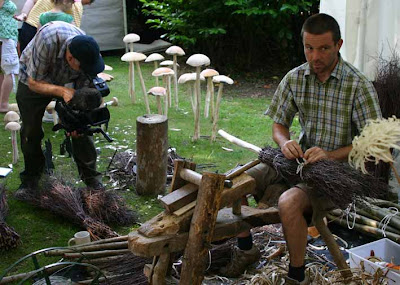
Then the top of the broom is trimmed with a huge and very sharp axe.

Adam may look young but he has long experience and knows how to look after his body. He was telling me that this is the bit of the process that takes the biggest toll on you physically as the shock of the blows travels back up your arm. Note how just at the point of impact he has actually relaxed his grip totally to avoid that shock.
 Next he cuts an ash handle and points the end
Next he cuts an ash handle and points the end
and trims the bark and rough knots away.

He positions the handle in exactly the right place in the head

then whacks it hard on a stump to drive it into place
 Before it goes too far a quick spin checks the balance is right, it makes no difference to folks buying them to pretend they are Harry Potter or to give the mother in law as a joke but for folk that want to sweep leaves up the balance is important.
Before it goes too far a quick spin checks the balance is right, it makes no difference to folks buying them to pretend they are Harry Potter or to give the mother in law as a joke but for folk that want to sweep leaves up the balance is important.
Then he drives in a wooden peg so the head can never come loose.

When demonstrating at these shows we all get used to the constant click and whir of cameras.

So quite a bit of work for a £12 broom, hard work but rewarding and keeping a skill alive that goes back centuries and is still useful today.

A nice article by Jon Henley in the Guardian here and Adam's website here





Hi Robin,
ReplyDeleteMy mother's family were all besom makers back in the 18th century, in Landford Wiltshire. They ended up as a huge community with the same surname, all working together and living on the same long road in the village. They eventually owned a large tract of woodland and used it for their raw materials. I was so pleased to read this article and to see that the traditions are ongoing, even if only rarely.
Many thanks,
Ann